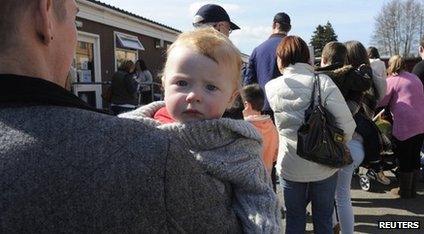Measles vaccine plan to target 1m children in England
- Published
Measles vaccination push
One million schoolchildren in England are to be offered measles jabs, as part of a plan to try and stop outbreaks of the illness.
Nearly 900 cases of the virus have been diagnosed in an epidemic in South Wales.
Measles is a viral illness that is easily spread by getting close to someone else who is infected.
There are worries many children haven't been properly vaccinated to protect themselves from the disease.
The vaccination campaign will be run through doctors surgeries, schools and community groups and will focus on kids aged 10 to 16 in England.
It's expected to cost the government £20m, with the Department of Health saying they have 1.2 million vaccines ready to go.

Vaccinations have already been held in schools and hospitals in the Swansea area of South Wales.
Why have so many kids not had the vaccine?
About 10 years ago, some parents chose not to give their children the measles jab because there were worries it might have harmful side effects.
In 1998, Doctor Andrew Wakefield published claims that the vaccine - known as MMR - was linked to a condition called autism in kids.
His research has since been shown to have major flaws and there is no proof that MMR is dangerous.
Mr Wakefield has been told he can't practice as a doctor any more.
"Disgraced doctor Andrew Wakefield's discredited and inaccurate research caused great harm to the MMR vaccination programme," Health Secretary, Jeremy Hunt has said.
It "led to thousands of parents choosing not to vaccinate their children against measles, mumps and rubella."
What is measles?
Measles can make you feel really sick. It starts off feeling like a really bad cold.
But as it goes on it causes a red-brown rash to appear on the skin and can make your tummy hurt and give you diarrhoea.
Symptoms usually last about two weeks, but in rare cases it can lead to further problems for kids who catch the disease.
